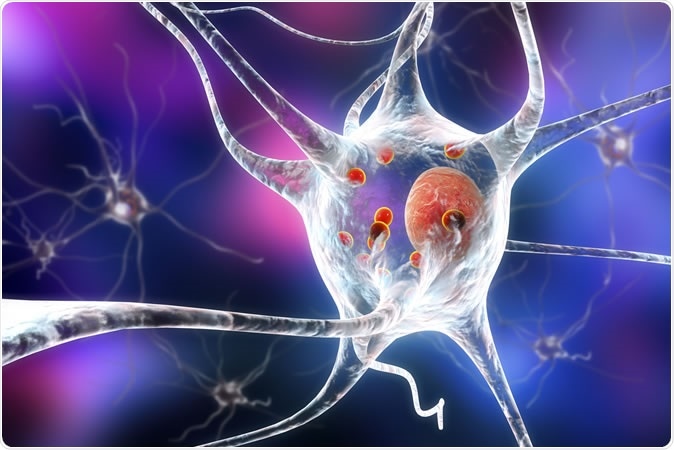Parkinson’s disease (PD) is a lifelong condition that affects the nerve cells in the brain that produce dopamine. As a result, people with this neurodegenerative disease experience tremors, changes in speech, gait issues, and muscle rigidity. Though it has no cure, a new drug used to treat cancer shows promise in treating Parkinson’s.
A team of medicine from Georgetown University Medical Center has found that a common drug used to treat leukemia, nilotinib (brand name Tasigna) shows potential as a treatment to relieve symptoms of PD.
Published in JAMA Neurology, the study aims to assess the effects of nilotinib on safety and pharmacokinetics on people with Parkinson’s disease, as well as to measure the change in biomarkers of the disease.
In an experimental clinical trial performed by the researchers, the cancer drug nilotinib, which was previously approved in treating leukemia, helped increase dopamine levels in the brain.

Parkinson's disease. 3D illustration showing neurons containing Lewy bodies small red spheres which are deposits of proteins accumulated in brain cells that cause their progressive degeneration. Image Credit: Kateryna Kon / Shutterstock
Testing nilotinib’s effects on Parkinson’s
The study examined 75 patients in a randomized, placebo-controlled trial. Initially, the researchers had 300 patients approached in a clinic, wherein 200 declined to participate in the trial. In the 100 patients who agreed, 25 were excluded and 75 participants remained.
The 75 patients were divided into three groups – the first group received 150-mg nilotinib, the second group had 300-mg nilotinib, and the last group received a placebo. Of the participants, 88 percent completed the study.
After the trial, the researchers found that the drug helped increase dopamine levels in the brain, which is a neurotransmitter lost as a result of neuronal damage, and a reduced level of neurotoxic proteins. Further, the drug, which is considered a tyrosine kinase inhibitor, stemmed from the motor decline.
“In this study, nilotinib appeared to be reasonably safe and detectable in the cerebrospinal fluid. Exploratory biomarkers were altered in response to nilotinib. Taken together, these data will guide the development of a phase 3 study to investigate the effects of nilotinib therapy in patients with Parkinson's disease,” the researchers wrote on the paper.
Nilotinib, or popularly known as Tasigna, is approved by the U.S. Food and Drug Administration (FDA) for the treatment of chronic myeloid leukemia at oral doses of 300 mg twice daily. Many studies have hinted that low doses of the drug enter the brain and degrade alpha-synuclein and tau in animal models of neurodegeneration.
"Our study shows that at these lower doses, nilotinib does not seem to cause Abl inhibition, suggesting it shouldn't have the same safety concerns that are potentially associated with Abl inhibition as might be the case at higher doses," Charbel Moussa, the director of the GUMC Translational Neurotherapeutics Program and lead author of the study, said.
The team also found that the drug helped decrease the levels of alpha-synuclein by 20 percent and tau proteins by 30 percent, which are two toxic proteins that are found in patients with Parkinson’s disease.
They assessed the outcomes at 12 and 15 months and compared the findings with the baseline data at the study of the study. The study findings revealed that the quality-of-life reports appeared to worsen in patients who received a placebo. On the other hand, the drug mitigated and halted the progression of non-mother symptoms for at least 12 months.
Moreover, all the study groups had improved motor testing at six months, but those who received the placebo and 300-mg stayed stable at 12 and 15 months follow up, while those receiving the 150-mg nilotinib improved between baseline assessment and 15 months.
“We see that subjects on nilotinib performed better overall on motor testing and had a better quality-of-life measurement during the study than the placebo group. These are important observations suggesting that nilotinib stabilized the disease--a potential disease-modifying effect that we haven't observed with any other agents. These clinical findings need confirmation through larger studies with more diverse populations," Dr. Fernando Pagan, the medical director of the GUMC Translational Neurotherapeutics Program, said.
Second most common neurodegenerative disorder
Parkinson’s disease is the second most common neurodegenerative disorder, next to Alzheimer’s disease. The disorder causes both motor and non-motor symptoms due to the accumulation of misfolded neurotoxic proteins, and a decline in dopamine levels.
In the United States alone, nearly one million is expected to live with Parkinson’s by 2020, which is more than the combined number of people diagnosed with Lou Gehrig’s disease, muscular dystrophy, and multiple sclerosis. Worldwide, there are more than 10 million people living with PD and about 60,000 Americans are diagnosed every year.
Journal reference:
Pagan FL, Hebron ML, Wilmarth B, et al. Nilotinib Effects on Safety, Tolerability, and Potential Biomarkers in Parkinson Disease: A Phase 2 Randomized Clinical Trial. JAMA Neurol. Published online December 16, 2019. doi: https://doi.org/10.1001/jamaneurol.2019.4200